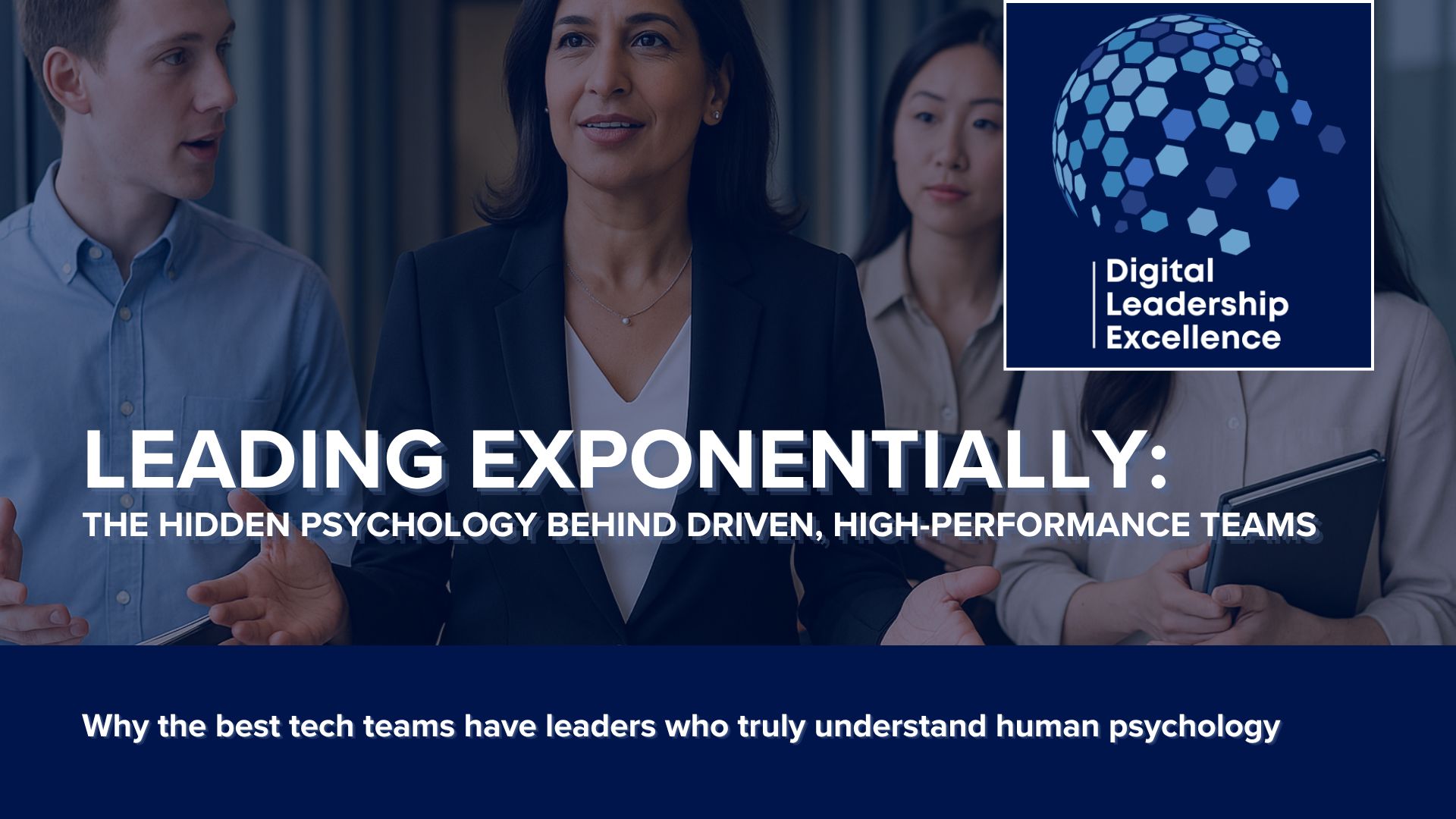Greetings, and welcome to Digital Leadership Excellence—Your trusted weekly guide to excelling in tech leadership, delivering results, and thriving with clarity and purpose. In every issue, we provide insights into winning strategies, growth tactics, and practical solutions, designed to support both current and aspiring technology leaders navigating the ever-evolving digital world.
1.0 Introduction
Last Friday, I was reflecting on one of the most transformative periods in my executive career.
I had taken over a technology team that was struggling. Projects were consistently behind schedule. Customer satisfaction was declining. Team morale was at an all-time low.
Six months later, we had delivered three major releases ahead of schedule. Customer satisfaction scores hit record highs. Employee retention improved by 35%.
The kicker? I didn't hire more people, extend budgets, or mandate longer hours.
Instead, I applied principles from psychology that most technology leaders completely ignore.
2.0 The Architecture of Human Performance
Every technology leader understands system architecture. You know how to design networks that scale, databases that perform, and applications that handle increasing load.
But here's what I've discovered working with technology executives across industries:
The leaders who achieve exponential results apply the same architectural thinking to human performance.
They understand that high-performing teams aren't accidents. They're engineered.

3.0 Why Technical Excellence Isn't Enough
I see this pattern constantly in my work with technology leaders:
Brilliant engineers get promoted to management roles. They assume their technical expertise will translate to leadership success.
They can debug complex systems faster than anyone. They architect elegant solutions to technical problems. They stay current with the latest frameworks and methodologies.
But something puzzling happens. Their teams underperform despite having strong technical capabilities.
Projects drag on longer than expected. Innovation stagnates. People seem disengaged despite working on interesting problems.
The missing piece? They're managing technology but not leading humans.
4.0 The Psychology Behind Exponential Performance
The highest-performing technology teams I've studied share five psychological characteristics that their leaders intentionally cultivate.
These aren't soft skills or nice-to-haves. They're performance drivers that create measurable business impact.
Intelligent Failure
Failure is a bad word. Most technology leaders focus on preventing failure. But the exponential leaders create environments where intelligent failure accelerates learning.
When your team knows that experimentation is valued over perfection, something powerful happens.
They start taking calculated risks. They propose innovative solutions. They push boundaries instead of playing it safe.
One leader I worked with transformed his team's innovation rate by changing one simple practice: In every retrospective, he started asking "What experiment should we try next?" instead of "What went wrong?"
The psychological shift was immediate. People began viewing challenges as opportunities to learn rather than problems to avoid.
Intrinsic Motivation Design
Human psychology research shows that people perform best when they feel autonomous, competent, and connected to purpose.
Most technology leaders accidentally undermine these psychological needs.
They assign tasks instead of ownership. They provide solutions instead of developing problem-solving capabilities. They focus on deliverables instead of connecting work to larger impact.
Exponential leaders flip this script.
Instead of saying "Here's what you need to build," they say "Here's the problem we're solving and why it matters - how do you think we should approach it?"
The result? People become invested in outcomes, not just outputs.
Collective Intelligence
The best technology teams think together better than any individual could think alone.
This doesn't happen naturally. It requires intentional design of how information flows, how decisions get made, and how alternative perspectives get integrated.
Exponential leaders create environments where different thinking styles, experiences, and approaches enhance rather than inhibit team performance.
They understand that the smartest person in the room isn't as valuable as the room full of people thinking smartly together.
Growth Acceleration
Every interaction either develops your team's capabilities or keeps them static.
Exponential leaders treat every challenge as a development opportunity.
When a complex problem arises, instead of assigning it to the most senior person (the safe choice), they ask: "Who would benefit most from tackling this challenge, and how can we support their success?"
This approach creates what researchers call "stretch experiences" - opportunities that develop capabilities just beyond someone's current comfort zone.
Over time, your entire team's capacity expands. Problems that once required your direct involvement become routine for your team members.

Systems Perspective on Human Dynamics
The most successful technology leaders apply systems thinking to human performance.
They recognize that individual capabilities are only part of the equation. Team performance emerges from the interaction between people, processes, and environment.
Instead of trying to optimize individual performance in isolation, they optimize the system that produces collective results.
Here's how this looks in practice:
They map communication patterns to identify where information gets lost. They analyze decision-making processes to eliminate unnecessary bottlenecks. They design workflows that naturally promote collaboration. They create feedback loops that accelerate learning and improvement.
Frequently they notice that their team's performance issues aren’t about technical skills - they are about information flow.
So they redesign how requirements move from product to engineering, how progress gets communicated to stakeholders, and how feedback reaches the development team.
The result? Project velocity increases without changing a single line of code.
5.0 The Exponential Effect in Action
Remember the transformation story I shared at the beginning?
Six months before those breakthrough results, my team was struggling.
Projects consistently missed deadlines. Clients pissed. Team members seemed disconnected from the work. Innovation had stalled.
I was working 70-hour weeks and commuting to 6 client sites in 5 states trying to keep everything moving forward. My wife was unhappy because I was never at home.
Then I started applying psychological architecture principles systematically.
Month 1: I focused on creating the freedom to fail - changing how my team approached failure and experimentation.
Month 2: I redesigned task assignment to increase intrinsic motivation, involving people in shaping their own work.
Month 3: I implemented practices to enhance collective intelligence, improving how the team thought through problems together.
Month 4: I shifted every challenge into a growth opportunity, using problems to develop capabilities.
Month 5: I applied systems thinking to optimize team dynamics and information flow.
The transformation was remarkable.
Not just in metrics, but in team culture. People started staying late by choice because they were engaged in their work. They began referring high-quality candidates. Innovation increased because psychological barriers to creativity had been removed. I could breathe again. My relationship with my wife improved.

6.0 Why This Matters for Your Leadership
Technology moves fast. Frameworks change. Tools evolve.
But human psychology remains constant.
When you understand how to architect environments that bring out the best in people, you create sustainable competitive advantage.
Your team becomes more adaptable because they're psychologically equipped to handle change. Your innovation increases because people feel safe to experiment and fail forward. Your retention improves because work becomes intrinsically rewarding. Your influence expands because you're developing leaders, not just managing contributors.

The Psychology-First Leadership Shift
Most technology leaders think their job is to optimize systems and manage deliverables.
Exponential leaders understand their job is to optimize human potential and create conditions for breakthrough performance.
This shift requires intentionality. You need to study your team's psychological dynamics as carefully as you study your technical architecture.
You need to design environments that promote the psychological states that drive high performance: safety, autonomy, mastery, purpose, and connection.
7.0 Your Next Step
Pick one element that resonates with your current challenges:
If your team avoids risk-taking, focus on freedom-to-fail. If engagement is low, work on intrinsic motivation design. If collaboration feels forced, develop collective intelligence. If capabilities aren't growing, emphasize growth acceleration. If performance feels chaotic, apply systems perspective to human dynamics.
Start small. Make one intentional change in how you interact with your team.
Observe the psychological impact, not just the task outcome.
Adjust based on what you learn.
The Hidden Truth
The highest-performing technology teams have something their peers lack: leaders who understand that exceptional results emerge from exceptional human dynamics.
They've discovered that the most sophisticated algorithm is still the human mind working at its best.
When you architect environments that unlock human potential, everything else becomes possible.
That's how you lead exponentially.
Want to explore how to apply psychological architecture principles to your specific team challenges?
Reply and let me know which element resonates most with your current leadership situation.



